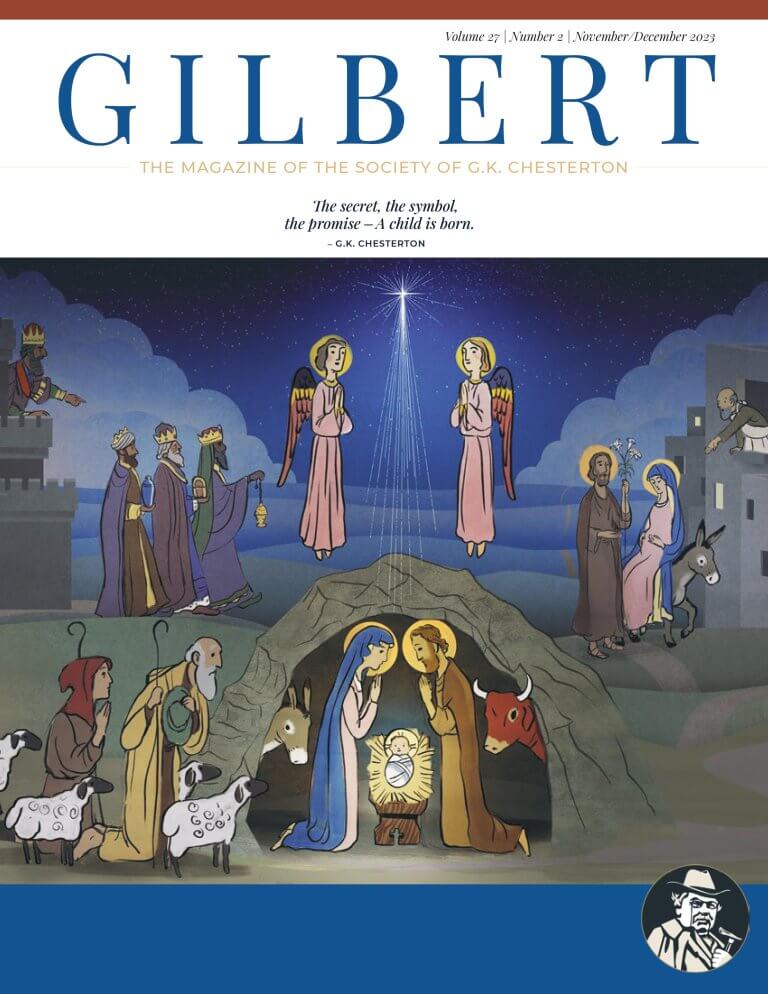G.K.’s Weekly, Volume 15
March 12, 1932 – September 3, 1932
Normal people generally take normal things for granted; even when they are no longer there. (G.K.’s Weekly, Mar. 19, 1932)
The normal things are not there anymore. But the “new normal” is not normal. We have fallen into a complacent compliance with this abnormal state of things. Part of the problem is that we have not only forgotten that certain modern notions are not normal, but that they are modern, preceding us by only a few generations that have been disruption and departure from tradition.
People are surprised when Chesterton argues, as he does in this volume of G.K.’s Weekly, that both Capitalism and Communism are modern notions. That is all they’ve ever known. But more surprising still, Chesterton argues that they are the same notion:
In face of any clean idea of Liberty and Property, the Capitalist and the Communist systems are simply the same thing. It is not a paradox; but a cold fact, which intellectuals at least can understand. It can be stated in a precise formula. Communism is that form of Capitalism in which all workers have an equal wage. Capitalism is that form of Communism in which the organising officials have a very large salary. That is the difference; and that is the only difference. Both presuppose property not personal, but worked from a centre and distributed as wages.
Very, very late in human history came this curious experiment of assuming that everything was better if we sold everything to one another and tried to cheat one another of as much as possible, even to the extent of selling our own labour to one another. Even if that modern experiment were still at the top of its practical success . . . even if it were bursting with prosperity, I should say that in its essence it was vulgar and filled with the spirit of a slave.
An increasing number of people seems willing to sacrifice their liberty and the liberty of their families for some nominal sort of economic security.
But wage slavery is not economic security. And economic security, in spite of what economists promise, doesn’t ever come about for the many, and hardly even for the few. “Monopoly on a large scale,” says Chesterton, really means “bankruptcy on a large scale.” He points out the irony “that the economists who were the high priests of the religion of wealth now discover themselves to be deceivers, unable to give real hope or counsel to their people.”
Similarly, the Communists are slaves, forced to “endure the same abnormal austerity in order to be abnormal, that we endure to be normal.” A person who has chosen a life of asceticism may be doing something noble and beautiful, but when a whole society is forced into it, “it becomes simply vandalism or barbaric destruction.” Or: “It is one thing to impoverish oneself; it is quite another responsibility to impoverish a whole cultural system of its culture.”
There is an alternative to Capitalism and Communism, a third way, or as GKC calls it “a third ideal.” (Even though he says the two are the same, he admits he hates Communism more than Capitalism). The only true alternative “is that individuals should own and be free.” Widespread individual ownership and personal autonomy is of course what GKC and his colleagues call Distributism (that unfortunate term).
Other modern notions that are normal? “Both conscription and disarmament are very modern notions.”
And Pacifism, which GKC says “will probably succeed in dragging us all into War.” The Pacifists trying to hide from the Great War are like atheists coming out and “giving little lectures after the Day of Judgment.”
Chesterton knows the rising threat from Germany. He recognizes that Nazism is the same as Prussianism. The only difference between Hindenburg and Hitler? “The old Prussian is post-war. The young Prussian is prewar.”
But what is the most destructive of modern notions that we have come to accept as normal?
Compulsory education.
Chesterton says the modern change came first when “Education was regarded as a substitute for Culture.” Or, as he says, it might even be better expressed by saying “instruction was regarded as a substitute for education.” It meant that we “had begun only to get facts by teaching and not truth by tradition.” And these facts were few, and were carefully selected, and “were almost entirely trivial.” Those are “the facts now taught by the new power of Compulsory Education.”
Hitler came and went, but we still get great satisfaction of beating him up as the last century’s great evil. But it is not Hitler who has been stealing the hearts and minds and souls of our children for the last few decades, who has been systematically doing away with the normal, promoting perversion, coddling confusion, and separating them not only from their parents but from their collective past. We can look to the public schools for that “vandalism or barbaric destruction.” If we really believe in liberty we would do everything possible to protect our children from today’s state-sponsored compulsory education. And there is an alternative. Start a Chesterton Academy.
Let’s end on an amusing note. This volume contains one of the few instances where GKC quotes himself. It’s one of his most famous lines – and he misquotes it. “When I said, ‘Whatever is worth doing is worth doing badly’ …” Okay, fans, what is the original line, and where is it from? Free tee shirt to the first person who gets it right. Send your answers to [email protected].
ABOUT DALE AHLQUIST
Dale Ahlquist is President of The Society of Gilbert Keith Chesterton, a worldwide lay apostolate dedicated to Catholic education, evangelization, and the social teaching of the church. He leads the Society’s Chesterton Schools Network, which exists to inspire and support the creation of joyfully Catholic, classical, and affordable high schools around the world. Learn More






